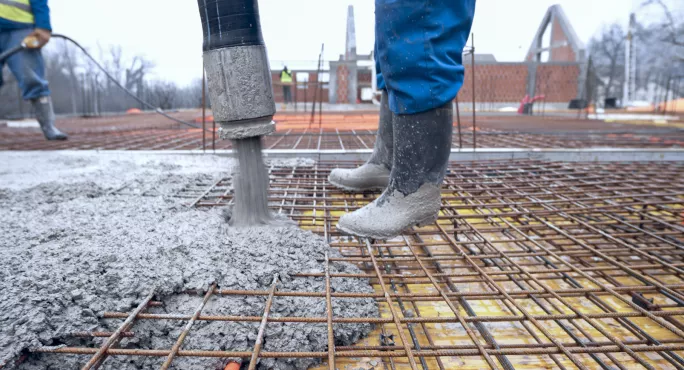RAAC: Ministers promise to discuss exam disruption fears

The academies minister and a top government official have promised to speak to schools minister Nick Gibb about disruption to exam students caused by the reinforced autoclaved aerated concrete (RAAC) crisis.
Baroness Barran, minister for the school system and sudent finance, and John Edwards, director general for the Department for Education’s Regions Group, said they would speak to Mr Gibb about parents’ concerns over the disruption Year 11 students had faced at St Leonard’s Catholic School in Durham.
St Leonard’s is one of the schools that has been most heavily affected by fears over the safety of buildings containing collapse-prone RAAC.
After delaying reopening at the start of term, it was found that only “a small number” of classrooms weren’t affected and so the school has moved to a mix of remote and face-to-face learning.
- Concern for 7,000 pupils on FSM at RAAC-hit schools
- Labour ready for ‘fight’ over RAAC and private school taxes
- 7 things the DfE told MPs about the RAAC crisis
The school is hoping to have all students back in face-to-face learning by the end of the month by bussing students to alternative sites.
It has told parents it hopes to have temporary classrooms on site by 4 December, although students will face a longer wait for specialist temporary classrooms to accommodate science laboratories and design and technology rooms.
The Bishop Wilkinson Catholic Education Trust (BWCET) had previously written to Ofqual to see if students affected by RAAC at the school would receive special consideration, or would be able to use centre-assessed grades (CAGs).
Mr Edwards confirmed at a meeting last week that CAGs and teacher-assessed grades (TAGs) would not be used.
Instead, the school has been advised to write to individual exam boards and Ofqual with evidence of the impact of disruption to students.
‘Absolutely disadvantaged’
St Leonard’s headteacher Chris Hammill said to parents: “We will be chapter and verse to those examination boards and to Ofqual about the nature of the disruption.
“And it hasn’t stopped now - we’ve had six weeks and it’s not over, the disruption continues.
“Our students are disadvantaged - they are absolutely disadvantaged.”
Parents asked whether the DfE would write to exam boards and Ofqual to support the school.
Mr Edwards emphasised Ofqual’s independence, but said: “The minister and I will talk to Minister Gibb and we will make sure A) the strength of what you have said is heard, and B) the importance of recognising just how wide a spectrum the impact of RAAC has been on different places and recognising that this school, I’m really sorry, is one of a very small number that’s at one end of the spectrum.”
Lack of optimism
Of the 174 schools that have been confirmed to have RAAC so far, 19 had to delay the start of term last month, five had to implement fully remote learning at least temporarily and 22 have used a mix of remote and face-to-face arrangements at least temporarily.
Mr Edwards and Lady Barran are meeting with St Leonard’s parents again this evening to provide an update on the situation.
BWCET CEO Nick Hurn told Tes he wasn’t optimistic about St Leonard’s getting any special consideration.
“We have accepted that Ofqual will not be able to assist us,” he said. “So we have followed their advice and have written to the exam boards alerting them to our situation and informing them that we will be submitting our case for our examination students in due course.”
Questions are ‘understandable’
An Ofqual spokesperson said: “It is entirely understandable that students in schools and colleges that have been affected by RAAC have questions about the arrangements for their exams.
“Schools and colleges have contingency plans in place for precisely this reason - and where there has been disruption, they should get in touch with their exam boards to discuss any further arrangements they may need to help minimise disruption and any impact on students.
“The Department for Education has also published guidance for schools managing the impact of RAAC.”
Tes revealed last week that 7,224 pupils eligible for free school meals were at schools that had faced disruption due to RAAC, prompting calls on the government to act to make sure they won’t be “doubly disadvantaged”.
At the Commons Education Select Committee session on RAAC in September, MP Mark Francois asked the DfE how it would respond to “endless interruptions” to the education of pupils who had faced RAAC and Covid-19.
A spokesperson for the Joint Council for Qualifications said: “JCQ members can work with schools on a case-by-case basis, depending on the specific circumstances.
“We would encourage the school to contact their exam board(s) so that they can have those conversations. In this case, we understand that conversations are already taking place.”
You need a Tes subscription to read this article
Subscribe now to read this article and get other subscriber-only content:
- Unlimited access to all Tes magazine content
- Exclusive subscriber-only stories
- Award-winning email newsletters
Already a subscriber? Log in
You need a subscription to read this article
Subscribe now to read this article and get other subscriber-only content, including:
- Unlimited access to all Tes magazine content
- Exclusive subscriber-only stories
- Award-winning email newsletters
topics in this article



